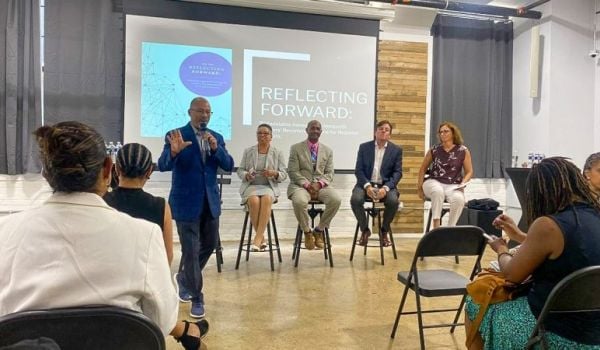Squeals of children and wafts of fried chicken are the first sign this is no ordinary meeting at Temple University Episcopal Hospital in North Philadelphia. A mural spread across the table, hand drawn in magic marker with messages such as “supporting wombmen who birth nations,” is further evidence.
The room filled slowly with doulas, greeting each other and hugging as they convened for their final training session.
Doulas? Doulas are labor support people, usually women who accompany mothers during their labor and delivery process. They physically support the mother with pain management techniques, like massage and breathing exercises, and mentally support women as they navigate the complex medical terrain around birth.
The training is part of a broader breast-feeding promotion program run by the Maternity Care Coalition, a Philadelphia non-governmental organization promoting women’s and children’s health.
Fifteen years ago, Philadelphia had 19 maternity wards. Now there are six. Wards have closed one by one, many citing financial burdens. Maternity wards lose money, Medicaid reimbursement rates fall short of the costs of births, and Philadelphia doctors pay high fees for medical malpractice insurance due to historically high levels of expensive lawsuits.
“We need people to recognize that we’re having a crisis in Philadelphia,” said Vivian Lowenstein, a Certified Nurse-Midwife who has worked in maternity centers around the city for nearly three decades. She likened the dearth of maternity facilities to urban food deserts: “You can’t get healthy food in some neighborhoods, and you can’t birth in certain neighborhoods.”
The doula training and breast-feeding are focused in North Philly because, according to many experts, that is the locus of Philadelphia’s maternal health crisis. The neighborhoods of Olney and Port Richmond have among the highest levels of neo-natal mortality in the city; breast-feeding has been linked to improved immunity among infants and to lower long-term obesity and diabetes rates.
Naima Black, a program manager with the Maternity Care Coalition, links low breast-feeding rates to wider health issues in the area. “The disparities in maternal and child health outcomes were evident not only in poor breast-feeding rates,” she said, “but also in other poor health outcomes.”
Episcopal Hospital, at Front Street and Lehigh Avenue, and Einstein Medical Center in Olney are Philadelphia’s northern-most hospitals with maternity wards, leaving swaths of women in North and Northeast Philly wondering where they will deliver their babies. Many have to commute into the city or out to the suburbs to deliver. Many access prenatal care at local clinics, transferring to a hospital only for delivery, so there is no continuity of care.
Einstein, along with Temple, have the lowest breast-feeding rates in the city, at 46 and 43 percent.
The graduating doulas will help women during pregnancy, delivery and postpartum to support them in having a healthy delivery and navigating new motherhood. And while the doulas are aware of the broader picture of maternal health challenges in Philadelphia, they are activists working on an individual level, in the room with women giving birth. “We are violent! We are so violent!” said O, a mononymous new doula of birth practices in the city.
Ruth Rodriguez described her 17-year-old nieces’ delivery. While she had requested a natural birth, the doctors and nurses pressured her into using an epidural, or a spinal anesthesia. “The doctor was calling her a ‘little girl’” throughout the delivery,” Rodriguez said. Afterwards, “I was downstairs and tears were just rolling down my face.” She said she hopes that, equipped with her skills from the training, she’ll be able to stand up for women in future births.

Allyn Gaestel is currently a Philadelphia Fellow for Next City. Much of her work centers on human rights, inequality and gender. She has worked in Haiti, India, Nepal, Mali, Senegal, Democratic Republic of Congo and the Bahamas for outlets including the Philadelphia Inquirer, the Los Angeles Times, Reuters, CNN and Al Jazeera. She tweets @allyngaestel.

_920_920_80.JPG)














